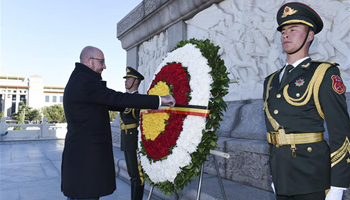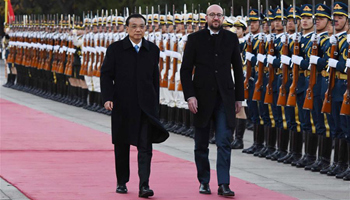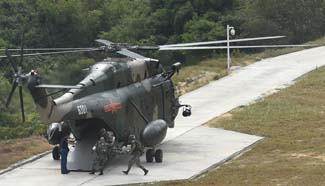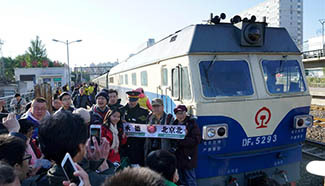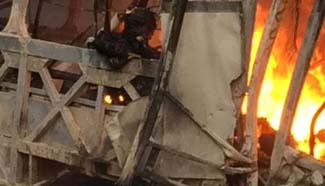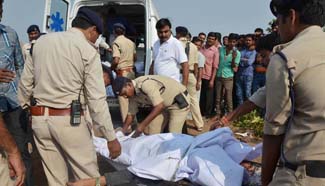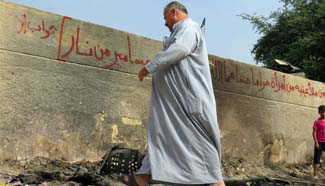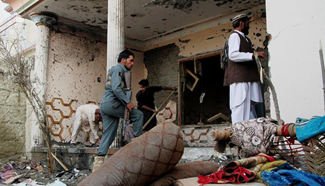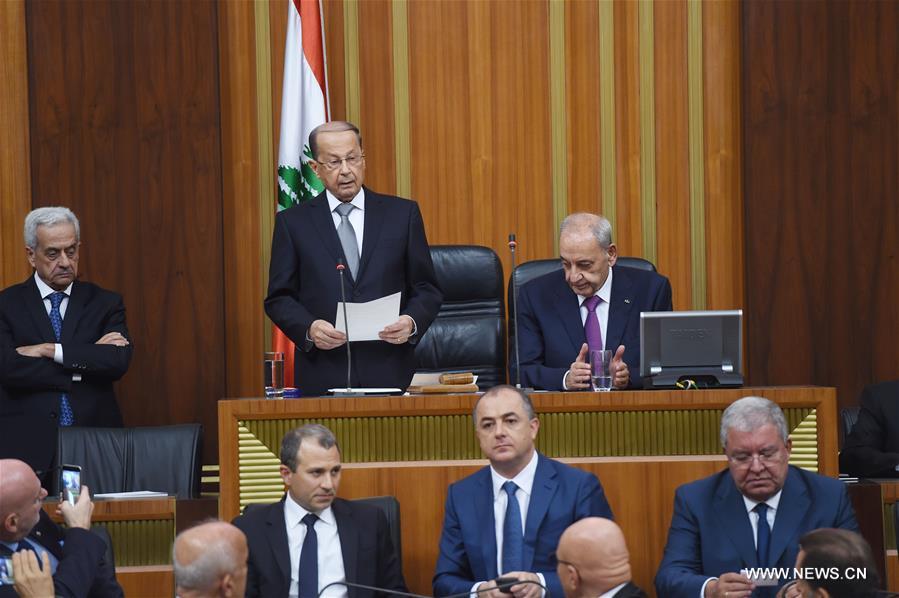
Newly elected Lebanese President Michel Aoun (C, back row) takes an oath after he was elected at the Lebanese parliament in Beirut, Lebanon on Oct. 31, 2016. Former army chief Michel Aoun was sworn in as the 13th president of Lebanon on Monday, ending a vacancy that lasted almost two and a half years. (Xinhua)
BEIRUT, Oct. 31 (Xinhua) -- Former army chief Michel Aoun was sworn in as Lebanon's 13th president on Monday, ending a vacancy that lasted almost two and a half years.
Aoun, an 81-year-old Christian, was elected president earlier on Monday in the Lebanese parliament.
Lebanon had been without a president since May 2014, when former President Michel Suleiman's six-year term ended.
Since then, parliament had held 45 failed sessions to elect a successor, each time failing to make quorum.
The parliament convened under Speaker Nabih Berri and was a full-house with 127 MPs of the 128-seat parliament present for the 46th electoral round.
Berri declared the constitutionally required quorum was met and called for the first round of the election in which the president should obtain two-thirds of votes.
However, after counting the votes of the first round, Aoun obtained only 84 votes while 36 MPs cast blank votes. Six votes were called void and one vote went to MP Gilberte Zouein.
Berri called for a second round of voting in which Aoun obtained 83 votes. Eighty-six votes were blank and 7 votes void while MP Setrida Geagea received one vote.
Berri declared Aoun as the 13th president of the Republic of Lebanon and called on the president-elect to be sworn in.
Aoun is allied with the Iran-backed Hezbollah party whose forces are fighting in Syria alongside forces of the government of President Bashar al-Assad.
He is expected to nominate Saad Hariri to return as prime minister, but with little consensus in the political landscape, the process of forming a government is likely to be long and arduous.
WHO IS AOUN?
Aoun was born in the Mount Lebanon Haret Hreik village in 1935.
He was named as commander-in-chief in 1984 to be the youngest officer to ever hold this position.
In 1988, President Amin Gemayel's term of office was nearing its end, and different Lebanese factions could not agree on a candidate to be his successor.
On Sept. 23, 1988, when Gemayel's term expired, Aoun was appointed as Lebanon's Prime Minister. Gemayel's acting prime minister, Salim al Hoss, also continued to act as the de facto prime minister. As a result, Lebanon was divided between a Syrian-backed government in west Beirut, and an Aoun-led government in east Beirut.
In March 1989, an attempt by Aoun to close all illegal seaports and stop all kinds of drug production and smuggling, led to what has come to be known as "Liberation War."
In May 1989, the Arab League empowered a High Committee on Lebanon, and arranged for a cease-fire in September, followed by a meeting of Lebanese lawmakers in Taef, Saudi Arabia.
After a month of intense discussions, the Lebanese MPs agreed on the Charter of National Reconciliation also known as the Taef Agreement.
Aoun opposed the agreement and issued a decree in early November dissolving the Lebanese parliament, calling for elections under the supervision of the United Nations.
In November, the dissolved parliament met at the Qoleiat Air Base in northern Lebanon, where it approved the Taef Agreement and elected Rene Moawad as the president.
Moawad was assassinated on Nov. 22 and the parliament elected Elias Hrawi on Nov. 24 to replace him.
On Oct. 13, 1990, a Syrian-led military operation, in which fighter planes were used by the Syrians for the first time in Lebanon, invaded the liberated areas of Lebanon and attacked the presidential palace in Baabda, thus forcing Aoun to take refuge in the French embassy.
He was forced into exile in France. He returned to Lebanon on May 7, 2005 following the assassination of former PM Rafic Hariri.
Aoun won the largest Christian representation in the 2005 parliamentary elections and led a 27-member bloc that he called "Change and Reform."
In 2006, Aoun reached an understanding with Hezbollah, a move that was behind the sharp political division in the country between what has been known as the March 8 Camp backed by Iran and Syria and the March 14 Camp backed by the West and Saudi Arabia.
During the Israeli 2006 war with Hezbollah, Aoun was a staunch ally to the militant party.
Aoun announced his candidacy to the presidential elections in 2008 after the term of President Emile Lahoud ended, but the internal disputes and an agreement reached in Qatar's capital Doha led to the election of former President Michel Suleiman.
Since 2014, Aoun has been the candidate of Hezbollah to the presidency, but the March 14 Camp strongly opposed his candidacy.
Late in 2015, head of the Lebanese Forces Samir Geagea made a sharp turn and withdrew from the presidential race and announced an agreement with Aoun to back his candidacy.
Saad Hariri also announced support for Aoun earlier this month, a move that facilitated the election of the former army general to be the 13th president of the Lebanese Republic.




